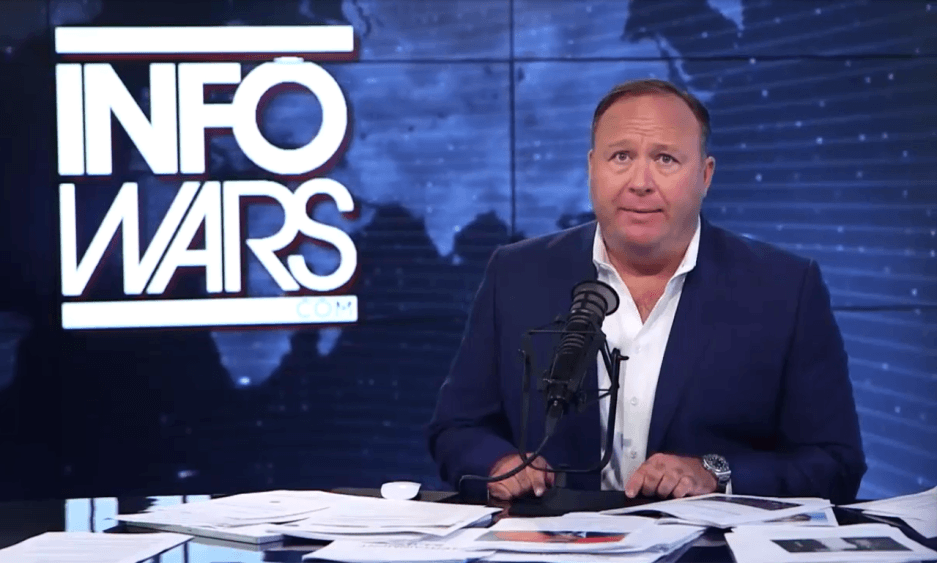
As an enthusiastic opponent of Alex Jones and anyone that likes him, I’m left bereft by the news that his output will no longer be freely available on YouTube. No one has done more than Jones to render political satire in 2018 redundant, and my mood could never but be improved when a snippet of his latest conspiracy-fuelled meltdown appeared on my twitter feed.
When, in the course of a recent custody hearing, he claimed that the shock jock of his videos was the creation of a “performance artist”, I was strangely disappointed. It’s not that I think he was telling the truth. But the claim spoke of a self-awareness, however slight, that threatened to dilute the experience of watching him interrogate an Amazon Alexa about whether it was working for the CIA, or claim the US government promotes homosexuality by adding chemicals to orange juice, or tell Andrew Neil that the eurozone had been a Nazi plot.
The cause of his current legal woes, though, is altogether harder to giggle at. Jones is being sued for slander by the families of some of those killed in the Sandy Hook massacre — in which twenty infants and six of their teachers were murdered — after he claimed they were actors in a false flag operation. They were subsequently harassed by his fans, and in one case were forced to move seven times. It is in the midst of this publicity that pressure began to mount on the platforms who host Jones’s content, and on Monday Facebook, Apple, YouTube, and Spotify each announced they would be removing his back catalogues and deleting his channels, citing violations of their community guidelines.
The decisions were on their face suspect, coming as they did all at once and relating to old posts, not connected to the trial, that have retrospectively been deemed to contain hate speech. Bear in mind, too, that these companies are currently engaged in a collective charm offensive amid the spread of fake news and revelations about the way they handle our data. Fuelling all this, in other words, are considerations of public relations, not principle.
But more interesting is the question of free expression in the digital age, a world whose terrain is still being mapped. Those supporting the ban say that, as private entities, social media companies should be at liberty to grant or deny a platform to whoever they want. That argument is basically fair, but it isn’t the whole story, because social media is now where public discourse occurs. A third of the global population are now monthly active users of Facebook. Broadcasters sign off reports with their twitter handles. Some of the most watched programmes in the world (Jones’s among them) are now hosted on YouTube. Social media pages are the pamphlets and the soapboxes and the theatres of the 21st century, and what’s more there is now no limit to how many people can have one. The space may be technically private, but it is in practice public. To grant that social media companies can exclude certain people from it is to concede that they will from now on have a veto over contributions to public debate.
Then there’s the question of whether they should want to exercise the ability to ban contributors if they hope to remain of any value. Free expression is right in principle, but it also serves a function in making arguments better. No conversation is worth having if certain opinions are excluded in advance, and no assertion or belief can be said to have won the day until it has been exposed to every counterpoint on offer. I don’t think I have anything to gain intellectually from watching Alex Jones. But nor do I think anyone else should get to make that call on my behalf — not one of his YouTube rivals, not some juvenile with a placard, and certainly not some topknot in Silicon Valley.
That isn’t to say social media has to be a space in which anything goes. These platforms can have their community guidelines just as states have their laws. But when someone breaks the law against, say libel, we address offences individually, and where appropriate we reprimand them. What we don’t do is rule they can never again speak in public or write for a newspaper. That would be an effective way of stopping them committing libel, but it would be a very blunt tool.
There would be an irony about the left having resolved to argue that private companies should be able to behave as they want, but that’s not what’s actually going on here. Because many of the move’s supporters are people who are anyway quite fond of banning, no-platforming, and censoring speakers whose views they don’t like. One contributor to cnn.com wrote: “The stripping of InfoWars from Facebook, Apple and other platforms is an important step in the recognition of nativist, nationalist and white supremacist hate speech as a form of terrorism”. She went on to say it was “sad” Jones is not being prosecuted under a statute of US law which “denies First Amendment protections to those sharing views involving support for or agreement with foreign terror organisations”.
This is an extreme example, but it represents a pattern of thought among those supporting these bans. In truth, the objections to the right of people like Jones to air one belief or another have little to do with the platform they happen to be standing on at the time.




Comments